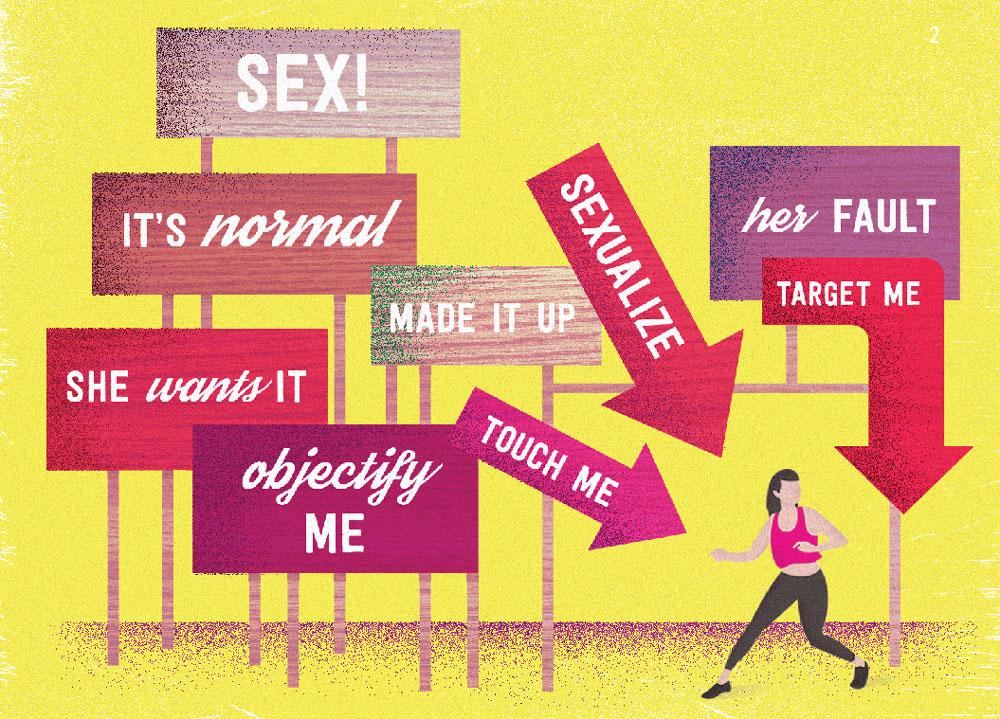Your donation will support the student journalists of Francis Howell North High School. Your contribution will allow us to purchase equipment and cover our annual website hosting costs.
It’s No Laughing Matter
In today’s society, rape is often joked about and not taken seriously, desensitizing the real issue.
Published: February 10, 2016
Sex without consent is no joke, though students can often hear the casual use of the word “rape” float through the hallways. Turn on the TV and one might find the latest “Game of Thrones” episode on, airing yet another rape scene. Many of the artists behind today’s hits have lyrics that often degrade women, portraying them as sexual objects. Together, these factors contribute to what is referred to in our society as rape culture.
“Rape culture is increasingly normal,” Scarlett Peterson, former leader and alumni of the Sex and Body Positivity Committee at Kennesaw State University said. “It’s always been there, especially in patriarchal societies.”
Rape culture affects both genders, however bias against women tends to be more common. It is easy for males to blame a victim of rape or assault and tarnish their image, however in many cases, such charges can be dismissed. Because men are not affected as frequently, it can make it difficult for them to be aware of rape culture. Women are sexualized and stigmatized.
Female victims may find it difficult to report claims of sexual assault because they are often blamed because of how they dressed or how much they had to drink during the account of the assault. However, because rape is generally perceived as something that only happens to women, men who are raped are often dismissed, shamed or invalidated as well.
“Rape culture doesn’t really give males the chance to speak up and say that this is not the norm,” sociology professor at St. Charles Community College, Vicky Herbel, said.
It’s often said that the entertainment industry plays a large role in condoning rape. “Blurred Lines”, a popular song from 2013 by Robin Thicke, is one of many songs that includes lyrics with derogatory phrases towards women, suggesting that there is a gray area between consensual sex and rape. Rape jokes are found often in the television sitcom “2 Broke Girls,” and the use of rape as a lighthearted joke is what promotes the attitudes of rape culture, according to Herbel.
“The joke you make is the experience of someone else,” Herbel said.
Social media platforms like Twitter and FaceBook gives people a medium to promote rape culture. The nature of social media makes it easy for anyone, from a high schooler to an adult, to make rape jokes or blame the victims of sexual assault because all interaction on social media is indirect. While the dress code is enforced in many schools to create a safe and disciplined learning environment, unequal or unfair enforcement also has the potential to condone rape culture by telling women that their bodies are more important than their education. Because of rape culture’s prevalence, wherever there is a social setting, rape culture is likely to manifest in various forms.
“Many people promote rape culture without realizing what they’ve done,” Peterson said.
When the ideologies of rape culture are seen everywhere in people’s daily lives and on social media, they lose sensitivity to the severity of the topic of rape, which is a major component of rape culture. For example, people may find it normal for a Super Bowl advertisement for a fast food chain to feature a very sexualized woman. This advertising tactic takes advantage of the objectification of women as a device to encourage sales. Ads by companies like Gucci and Prada also include the objectification of both men and women.
“The victims who came forward during the Bill Cosby scandal were typically dismissed because he was seen as the father of television and a good role model,” Peterson said.
Even those who are advocates against rape culture may occasionally promote it unintentionally. Because rape culture is so internalized, it makes it hard to stop since the thoughts people have seem so normal, even if they have harmful implications that they don’t recognize.
“People subconsciously promote rape culture,” Herbel said. “You may sing along to a song that contains lyrics that promote rape culture. It’s hard to escape, but important to be critical of it.”
Although progress has been made with bringing about awareness of the spread of rape culture and the seriousness of sexual assault, there is still much to be done. According to Herbel, the conversation of sexual violence is a lot more prevalent than it used to be, but the movement against rape culture is not yet strong enough to halt it. Peterson suggests that keeping the conversation of rape culture going and letting those who make jokes know that the jokes are not acceptable can help challenge the normalization of rape.
“By making rape culture part of the daily conversation, it will make people more aware of the seriousness of rape,” Herbel said.

